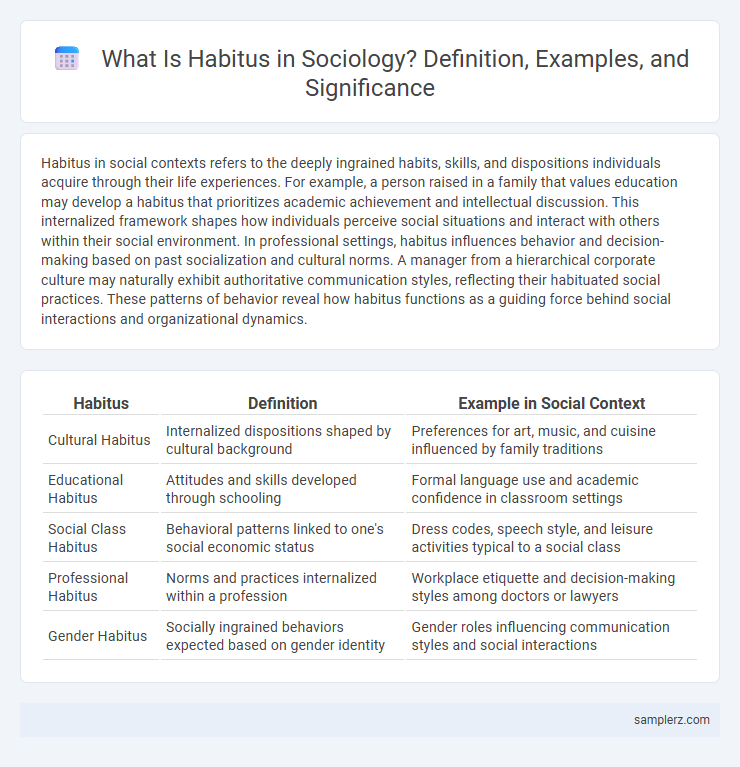Habitus in social contexts refers to the deeply ingrained habits, skills, and dispositions individuals acquire through their life experiences. For example, a person raised in a family that values education may develop a habitus that prioritizes academic achievement and intellectual discussion. This internalized framework shapes how individuals perceive social situations and interact with others within their social environment. In professional settings, habitus influences behavior and decision-making based on past socialization and cultural norms. A manager from a hierarchical corporate culture may naturally exhibit authoritative communication styles, reflecting their habituated social practices. These patterns of behavior reveal how habitus functions as a guiding force behind social interactions and organizational dynamics.
Table of Comparison
| Habitus | Definition | Example in Social Context |
|---|---|---|
| Cultural Habitus | Internalized dispositions shaped by cultural background | Preferences for art, music, and cuisine influenced by family traditions |
| Educational Habitus | Attitudes and skills developed through schooling | Formal language use and academic confidence in classroom settings |
| Social Class Habitus | Behavioral patterns linked to one's social economic status | Dress codes, speech style, and leisure activities typical to a social class |
| Professional Habitus | Norms and practices internalized within a profession | Workplace etiquette and decision-making styles among doctors or lawyers |
| Gender Habitus | Socially ingrained behaviors expected based on gender identity | Gender roles influencing communication styles and social interactions |
Defining Habitus in Social Contexts
Habitus in social contexts refers to the deeply ingrained habits, skills, and dispositions that individuals acquire through their life experiences and social environment. It shapes perceptions, actions, and interactions, influencing how people navigate social structures and cultural norms. Pierre Bourdieu's concept of habitus highlights the dynamic relationship between individual agency and societal constraints, explaining patterns of behavior within various social fields.
Everyday Examples of Social Habitus
Social habitus manifests in everyday practices such as language use, dining etiquette, and fashion choices that reflect an individual's social background and cultural capital. For instance, working-class individuals might prioritize practicality in clothing, while middle-class groups emphasize style and brand recognition, showcasing their social distinction. These habitual behaviors unconsciously reinforce social structures and group identity across different contexts.
Family Influence on Social Habitus
Family influence shapes social habitus by transmitting cultural norms, values, and behaviors through everyday interactions and shared experiences. Parental language use, educational expectations, and social practices within the family environment significantly impact an individual's social positioning and dispositions. This internalized social framework guides how individuals perceive social structures and navigate social spaces throughout their lives.
Educational Institutions Shaping Habitus
Educational institutions play a crucial role in shaping habitus by instilling social norms, values, and behaviors that align with dominant cultural capital. The curriculum, teacher expectations, and peer interactions collectively influence students' dispositions and future social opportunities. This process reinforces social stratification by perpetuating existing power structures within society.
Workplace Culture and Social Habitus
Workplace culture deeply reflects social habitus, shaping employees' behaviors, values, and communication styles based on shared social norms and experiences. Habitus influences how individuals navigate organizational hierarchies, interpret professional expectations, and engage in collaboration within diverse teams. Understanding the interplay between social habitus and workplace culture enhances strategies for fostering inclusive environments and improving employee integration.
Habitus and Social Class Distinctions
Habitus shapes individual behaviors and preferences deeply influenced by social class distinctions, where middle and upper classes often develop cultural tastes aligned with their socioeconomic status. These ingrained dispositions guide everyday practices, such as language use, consumption patterns, and leisure activities, reinforcing social hierarchies. Understanding habitus reveals how social class perpetuates itself through subtle, habitual expressions embedded in daily life.
Cultural Habitus in Community Practices
Cultural habitus in community practices manifests through shared rituals, symbols, and norms that shape collective identity and social behaviors. These ingrained dispositions influence how individuals perceive their roles, communicate, and participate in cultural events, reinforcing social cohesion. For example, traditional festivals and communal storytelling serve as embodiments of cultural habitus, perpetuating values and social understanding within the community.
Media’s Role in Developing Social Habitus
Media shapes social habitus by influencing individuals' perceptions, behaviors, and cultural norms through repeated exposure to specific narratives and representations. Television, social media, and news outlets contribute to the internalization of societal expectations, impacting tastes, language, and interaction styles within different social groups. This continuous media engagement fosters a shared framework that guides social practices and reinforces collective identities.
Peer Groups and the Formation of Habitus
Peer groups play a crucial role in shaping habitus by influencing individuals' behaviors, values, and perceptions through shared experiences and social interactions. The formation of habitus within peer groups reflects internalized norms and practices that guide social conduct and identity construction. This dynamic process embeds cultural capital and social positioning, reinforcing group cohesion and individual conformity.
Overcoming and Transforming Social Habitus
Overcoming and transforming social habitus involves reshaping ingrained behaviors and cultural norms that influence individuals' actions within their social environment. Social movements and education programs can challenge existing habitus by introducing new perspectives that encourage critical reflection and adaptive change. These processes enable individuals to break free from restrictive social patterns, fostering social mobility and identity reconstruction.

example of habitus in social Infographic
 samplerz.com
samplerz.com